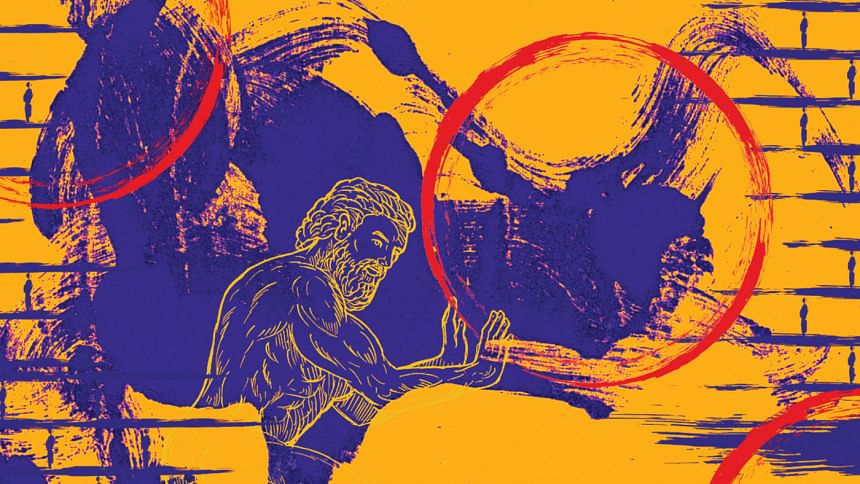Sisyphus laughs: the laughter of God

At last, God heeded Sisyphus's prayer—a plea he had been making for countless centuries. Each time, he hoisted the rock onto his shoulders, convinced that this would be the time it ascended with ease. Liberation lay just beyond the peak; if only he could cast the wretched stone to the other side, he would finally be free. Yet every time, despair greeted him anew. In the final moments, the treacherous rock slipped from his grasp, tumbling with a storm's fury back to the base of the mountain, where it awaited him—unyielding as ever.
No human had ever been so desolate. He had hurled curses at God—none were left unsaid. Yet, when he began anew, he was overcome with remorse, his tears flooding the barren earth. The people of the world marvelled: how could so much water be held atop the peaks of the mountains? Sisyphus had invoked God's name so many times that even if all of humanity joined him, they could not match his devotion. And yet, God's heart remained unmoved. He had all but forgotten Sisyphus.
At long last, Sisyphus was set free. The great stone, as if buoyed by the softness of the air, rose and disappeared. All of it was by God's will—by His grace, no less. From this day forth, Sisyphus was the sole master of his life. His deeds would bear him fruits, just as they did for any other person. Whether he accepted God or rejected Him was his choice. If he wished, he could abandon a task midway to pursue another. He was no longer bound by the rigid laws of endurance. Even time would not command him, for he was now free to defy it.
However, the god had his conditions. Sisyphus was told he had to live as a human, bound to a mortal's existence. Yet, as one, who bore a curse, he was denied the release of death. Sisyphus, without a trace of hesitation, agreed. With a strange joy, he embraced all the terms set before him. After all, was there any life more infinitely varied than that of humans? A thousand different lives awaited him, and his endless, deathless existence would unfold as he lived through them, one after another.
Sisyphus descended into the teeming world of humanity. At first, he was enthralled. Everything delighted him; every task seemed to brim with fresh vigour. He married with grand celebration, raised children, arranged their weddings, tilled the soil, worked in offices and courts, played the role of both policeman and thief—what didn't he do? Several lifetimes passed in unbridled joy. But that unending joy began to wane. He watched as people grew older, changed, and eventually faded from his world. New faces appeared, filled the spaces left behind, and in turn, they too departed. Sisyphus remained. People aged, time reshaped them, but Sisyphus stayed unchanged. His work, too, remained the same, repetitive and ceaseless.
Sisyphus stands atop the hill, watching the endless procession of people—coming and going, passing him by. He, too, rolls along with them, tumbling ceaselessly. Life, for them, unfolds in a familiar pattern: they marry, they work, they have children, and those children grow into full-fledged humans, who grow old, fall ill, and eventually die. And in between? They eat, they defecate, they quarrel, they love, they sleep by the clock, and wake up by the clock—each life confined to the same unchanging mould. From a distance, they all appear as if they were Sisyphus in their own ways.
Yet, they are far more fortunate than he was. For them, there is death—a definitive end to their suffering. Their anguish has a conclusion, their repetition a finite span. Before monotony tightens its grip entirely, life would reach its natural end. And that, perhaps, is why their lives brim with such fervour, such intensity!
Sisyphus, however, was denied the mercy of death. For him, there was only the eternal charade of playing at being human. Watching them, he felt an aching envy. Ah, what a wondrous thing it would be to live like that!
Sisyphus approached the god once more—this time, to plead for death. He craved it, no matter how harrowing or unbearable it might be. And this time, the gods were more willing to listen. But, as always, there was a condition—nothing comes unconditionally from the gods; such is their nature. The decree was clear: after death, Sisyphus would dwell eternally among humans—either in heaven or in hell. Once he embraced death, the possibility of dying a second time would be forever denied. To live is to be born once and to die once. And the life that follows death is, like the gods themselves, eternal—untouched by decay, impervious to endings. Not even the god can undo that life with another death, for the act of dying itself is what grants that immortality.
After hearing everything, Sisyphus's enthusiasm vanished in an instant. He has no desire to go anywhere—neither heaven nor hell. What meaning do heaven or hell hold for a life that stretches on eternally, monotonously, without end? Sisyphus craves an end. He longs for his existence to dissolve, like a dewdrop in the morning sun, like a fallen leaf swept away by the wind, like the fleeting notes of a bird's song—gone forever.
But God made it clear: there is no such thing as an end. If there were, God Himself would have declared, millions of years ago, "I've had enough."
The stone keeps rolling. Sisyphus no longer prays. In his thoughts, God and he have become bound by the same fate. At the foot of the mountain, one by one, people die, and Sisyphus laughs—the laughter of God.
Translated by Haroonuzzaman
Mojaffor Hossain is a distinguished fiction writer within the realm of contemporary Bangla literature. He began his professional journey as a journalist and is currently employed as a translator at the Bangla Academy.
Haroonuzzaman is a translator, novelist, poet, researcher, and essayist. Besides teaching English in Libya and Qatar for about 12 years, he has had 20 years of teaching experience in English Language and Literature at Independent University, Bangladesh (IUB).

 For all latest news, follow The Daily Star's Google News channel.
For all latest news, follow The Daily Star's Google News channel. 











Comments